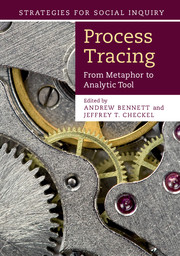Book contents
- Frontmatter
- Contents
- List of figures
- List of tables
- List of contributors
- Preface
- Part I Introduction
- Part II Process tracing in action
- 2 Process tracing the effects of ideas
- 3 Mechanisms, process, and the study of international institutions
- 4 Efficient process tracing
- 5 What makes process tracing good?
- 6 Explaining the Cold War’s end
- 7 Process tracing, causal inference, and civil war
- Part III Extensions, controversies, and conclusions
- Appendix Disciplining our conjectures
- References
- Index
5 - What makes process tracing good?
Causal mechanisms, causal inference, and the completeness standard in comparative politics
Published online by Cambridge University Press: 05 November 2014
- Frontmatter
- Contents
- List of figures
- List of tables
- List of contributors
- Preface
- Part I Introduction
- Part II Process tracing in action
- 2 Process tracing the effects of ideas
- 3 Mechanisms, process, and the study of international institutions
- 4 Efficient process tracing
- 5 What makes process tracing good?
- 6 Explaining the Cold War’s end
- 7 Process tracing, causal inference, and civil war
- Part III Extensions, controversies, and conclusions
- Appendix Disciplining our conjectures
- References
- Index
Summary
Introduction
Why did some European democracies survive the interwar period while others were replaced by fascist dictatorships? Why do some instances of civil war culminate in democratic transitions? What are the causes of the emergence of sovereign nation-states in early modern Europe? Scholars addressing these foundational questions of comparative politics have been among the pioneers of process tracing. A close examination of a small number of such important studies should be illuminating for our efforts to articulate “best practices” for causal inference via within-case analysis, or process tracing. On the one hand, these studies give us an opportunity to observe closely the procedures and standards that have emerged over the past decade – practices that are summarized concisely in the editors’ introduction to this volume. On the other, they give us the raw material for thinking about a refined and expanded set of best practices and evaluative standards.
I develop these arguments by closely examining a small number of exemplars of process tracing. Before conducting that assessment, however, it is helpful to highlight where these studies overlap with our extant understanding of process tracing, but also where they direct us toward some new methodological directions.
- Type
- Chapter
- Information
- Process TracingFrom Metaphor to Analytic Tool, pp. 126 - 152Publisher: Cambridge University PressPrint publication year: 2014
- 22
- Cited by

